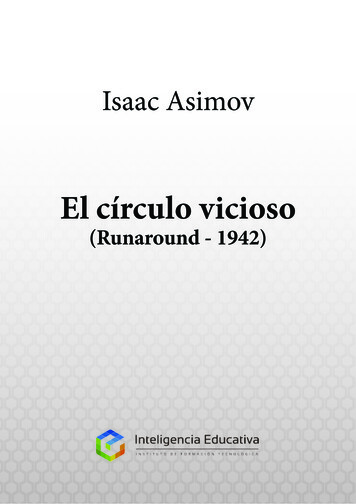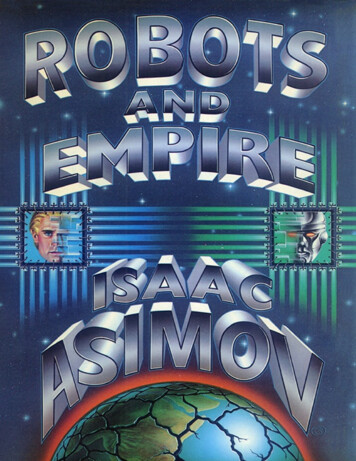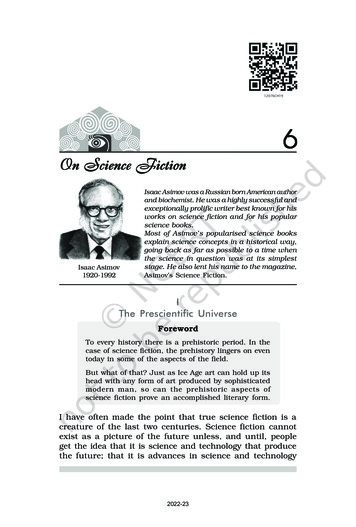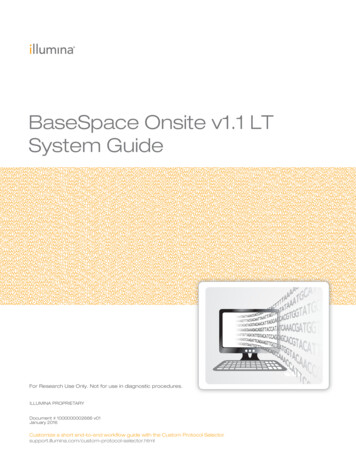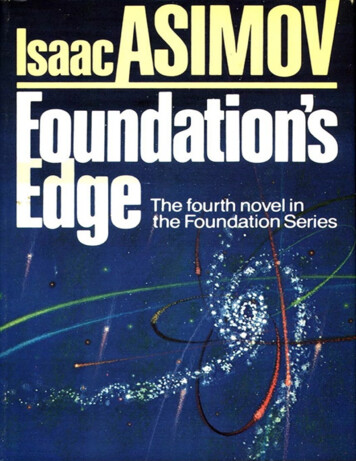
Transcription
See what science fiction and fantasy authorsfrom A to Z are still saying aboutIsaac Asimov:“The extraordinary and grand concept which forms the basis of Asimov’strilogy was what drew me to science fiction originally.”—Brian W. Aldiss“With his fertile imagination, his wit, and his prolific output, IsaacAsimov truly laid the foundation for all future generations of sciencefiction writers.”—Kevin J. Anderson“A true polymath, a superb rationalist, an exciting and accessible writerin both fiction and nonfiction, Isaac Asimov was simply a master of allhe surveyed. Beloved entertainer, pioneer, author of many of the mostendearing and lasting stories of the twentieth century, he will probablybe best known as the creator of Hari Seldon, Lije Baley, R. DaneelOlivaw, Trantor, the Encyclopedia Galactica, and the idea that robots—our eternal servants—must play by the rules, even when they seem notto.”—Greg Bear“Isaac Asimov was not only one of the most important writers in sciencefiction, he was one of the best and brightest people ever. Read I, Robot tosee this sparkling genius at his best.”—Ben Bova“Asimov served wondrous meals-of-the-mind to a civilization that wasstarved for clear thinking about the future. To this day, his visions spiceour ongoing dinner-table conversation about human destiny.”—DavidBrin“Asimov is the reason I started reading science fiction. I cut my teeth(figuratively) on The Caves of Steel and followed it up with The NakedSun. Some writers show us a different way of looking at the world, butIsaac Asimov opened up the door to the universe and invited us to come
along for one hell of a fabulous ride.”—Esther Freisner“Isaac Asimov’s ability to take the Big Ideas so crucial to the sense ofwonder in science fiction and embody them in compellingly humanstories and settings—particularly in his robot stories, Foundation works,and other speculative fiction both long and short—raised the bar highfor all of us who have followed him in the tradition of idea-drivenscience fiction. Asimov was a law unto himself, yet he gave his fellowwriters laws—of robotics, and psychohistory—that have shaped all of uswho have tried to write of machine intelligence or of human civilizationsvast in time and space. This is his great and vital legacy.”—Howard V.Hendrix“Asimov’s Foundation trilogy was the pivotal touchstone in my life increative fiction. His vision and scope spanned the galaxy across eons andat the same time he told deeply personal stories of living characters. Thewriter I am sprang from the boy that these books touched back then.They continue to move me still. Thank you, Isaac, for opening my mindand life to the possible.”—Tracy Hickman“I grew up on the ABCs of science fiction—Asimov, Bradbury, Clarke.There’s a reason Asimov’s name comes first, and not just because of thealphabet!”—Janis Ian“Asimov’s Foundation series stands the test of time. They were amongthe first science fiction books I ever read and I still enjoy them today asan adult. The genre owes much to his sprawling vision of galacticempire.”—Karen Lowachee“The idea of robots rising up against their human masters is at least asold as the word ‘robot’ itself. Asimov was unique in treating this assimply an engineering problem, which he solved with his famous ThreeLaws of Robotics. This by itself would have earned him a spot in history,but he went on (and on!) to explore the ramifications and unintendedconsequences of his solution. In so doing, he crafted one of the mostvibrant, original, and enduring future histories the field of science fictionhas ever seen, or probably ever will. Reader, you are in for a treat.”—
Wil McCarthy“If anything can be said to have been the launchpad for space agescience fiction, it has to be the Foundation trilogy. It’s a classic. And it’sunforgettable.”—Jack McDevitt“I’m sure there will be more Foundation stories, and more robot stories,and more science fictional mysteries, because those are Isaac’s legaciesto us. But reading them won’t be quite the same. There was only oneIsaac Asimov; there will never be another.”—Mike Resnick“The Foundation series is one of the masterpieces of science fiction. Ifyou’ve never read these novels, then you’re in for a treat, and even ifyou’ve already read them, then you owe it to yourself to reread them,because they’re still great.”—Allen M. Steele“Quite simply, Asimov got me started.”—Liz Williams“Isaac was still in his teens when I met him, a fan of mine before I was afan of his. Writing for John W. Campbell back in the famous ‘golden ageof science fiction,’ he became one of the founders of our field. With therobot stories and the Foundation stories, he helped to shape sciencefiction as we know it.”—Jack Williamson
Bantam Spectra Booksby Isaac AsimovTHE FOUNDATION NOVELSPrelude to FoundationFoundationFoundation and EmpireSecond FoundationFoundation’s EdgeForward the FoundationTHE ROBOT NOVELSI, RobotThe Caves of SteelThe Naked SunThe Robots of DawnNemesisThe Gods ThemselvesFantastic VoyageWith Robert SilverbergNightfallThe Positronic Man
FOUNDATION’S EDGEA Bantam Spectra Book / published by arrangement with DoubledayPUBLISHING HISTORYDoubleday hardcover edition published 2002Bantam mass market edition / November 1981Bantam mass market reissue / September 2004Published byBantam DellA Division of Random House, Inc.New York, New YorkAll rights reservedCopyright 1982 by Nightfall, Inc.Library of Congress Catalog Card Number: 00-21182No part of this book may be reproduced or transmitted in any form or byany means, electronic or mechanical, including photocopying, recording,or by any information storage and retrieval system, without the writtenpermission of the publisher, except where permitted by law.For information address: Bantam Books, New York, New York.Bantam Books and the rooster colophon are registered trademarks ofRandom House, Inc.eISBN: 978-0-553-90093-4v3.1
To the memory of Judy-Lynn del Rey(1943–1986,a giant in mind and spirit)
CONTENTSCoverOther Books by This AuthorTitle eGaiaCollisionDecisionConclusionAfterword by the AuthorAbout the Author
PROLOGUETHE FIRST GALACTIC EMPIRE WAS FALLING. IT HAD been decayingand breaking down for centuries and only one man fully realized thatfact.He was Hari Seldon, the last great scientist of the First Empire, and itwas he who perfected psychohistory—the science of human behaviorreduced to mathematical equations.The individual human being is unpredictable, but the reactions ofhuman mobs, Seldon found, could be treated statistically. The larger themob, the greater the accuracy that could be achieved. And the size of thehuman masses that Seldon worked with was no less than the populationof all the inhabited millions of worlds of the Galaxy.Seldon’s equations told him that, left to itself, the Empire would falland that thirty thousand years of human misery and agony would elapsebefore a Second Empire would arise from the ruins. And yet, if one couldadjust some of the conditions that existed, that Interregnum could bedecreased to a single millennium—just one thousand years.It was to insure this that Seldon set up two colonies of scientists thathe called “Foundations.” With deliberate intention, he set them up “atopposite ends of the Galaxy.” The First Foundation, which centered onphysical science, was set up in the full daylight of publicity. Theexistence of the other, the Second Foundation, a world ofpsychohistorical and “mentalic” scientists, was drowned in silence.In The Foundation Trilogy, the story of the first four centuries of theInterregnum is told. The First Foundation (commonly known as simply“The Foundation,” since the existence of another was unknown to almostall) began as a small community lost in the emptiness of the OuterPeriphery of the Galaxy. Periodically it faced a crisis in which thevariables of human intercourse—and of the social and economic currentsof the time—constricted about it. Its freedom to move lay along only one
certain line and when it moved in that direction, a new horizon ofdevelopment opened before it. All had been planned by Hari Seldon,long dead now.The First Foundation, with its superior science, took over thebarbarized planets that surrounded it. It faced the anarchic warlordswho broke away from the dying Empire and beat them. It faced theremnant of the Empire itself under its last strong Emperor and its laststrong general—and beat it.It seemed as though the “Seldon Plan” was going through smoothlyand that nothing would prevent the Second Empire from beingestablished on time—and with a minimum of intermediate devastation.But psychohistory is a statistical science. Always there is a smallchance that something will go wrong, and something did—somethingwhich Hari Seldon could not have foreseen. One man, called the Mule,appeared from nowhere. He had mental powers in a Galaxy that lackedthem. He could mold men’s emotions and shape their minds so that hisbitterest opponents were made into his devoted servants. Armies couldnot, would not, fight him. The First Foundation fell and Seldon’s Planseemed to lie in ruins.There was left the mysterious Second Foundation, which had beencaught unprepared by the sudden appearance of the Mule, but whichwas now slowly working out a counterattack. Its great defense was thefact of its unknown location. The Mule sought it in order to make hisconquest of the Galaxy complete. The faithful of what was left of theFirst Foundation sought it to obtain help.Neither found it. The Mule was stopped first by the action of awoman, Bayta Darell, and that bought enough time for the SecondFoundation to organize the proper action and, with that, to stop theMule permanently. Slowly they prepared to reinstate the Seldon Plan.But, in a way, the cover of the Second Foundation was gone. The FirstFoundation knew of the Second’s existence, and the First did not want afuture in which they were overseen by the mentalists. The FirstFoundation was the superior in physical force, while the SecondFoundation was hampered not only by that fact, but by being faced by adouble task: it had not only to stop the First Foundation but had also toregain its anonymity.This the Second Foundation, under its greatest “First Speaker,” Preem
Palver, managed to do. The First Foundation was allowed to seem towin, to seem to defeat the Second Foundation, and it moved on togreater and greater strength in the Galaxy, totally ignorant that theSecond Foundation still existed.It is now four hundred and ninety-eight years after the FirstFoundation had come into existence. It is at the peak of its strength, butone man does not accept appearances—
1COUNCILMAN1.“I DON’T BELIEVE IT, OF COURSE,” SAID GOLAN Trevize, standing onthe wide steps of Seldon Hall and looking out over the city as it sparkledin the sunlight.Terminus was a mild planet, with a high water / land ratio. Theintroduction of weather control had made it all the more comfortableand considerably less interesting, Trevize often thought.“I don’t believe any of it,” he repeated and smiled. His white, eventeeth gleamed out of his youthful face.His companion and fellow Councilman, Munn Li Compor, who hadadopted a middle name in defiance of Terminus tradition, shook hishead uneasily. “What don’t you believe? That we saved the city?”“Oh, I believe that. We did, didn’t we? And Seldon said that we would,and he said we would be right to do so, and that he knew all about it fivehundred years ago.”Compor’s voice dropped and he said in a half-whisper, “Look, I don’tmind your talking like this to me, because I take it as just talk, but if youshout it out in crowds others will hear and, frankly, I don’t want to bestanding near you when the lightning strikes. I’m not sure how precisethe aim will be.”Trevize’s smile did not waver. He said, “Is there harm in saying thatthe city is saved? And that we did it without a war?”“There was no one to fight,” said Compor. He had hair of a butteryyellow, eyes of a sky blue, and he always resisted the impulse to alterthose unfashionable hues.
“Have you never heard of civil war, Compor?” said Trevize. He wastall, his hair was black, with a gentle wave to it, and he had a habit ofwalking with his thumbs hitched into the soft-fibered sash he alwayswore.“A civil war over the location of the capital?”“The question was enough to bring on a Seldon Crisis. It destroyedHannis’s political career. It put you and me into the Council last electionand the issue hung—” He twisted one hand slowly, back and forth, like abalance coming to rest on the level.He paused on the steps, ignoring the other members of thegovernment and the media, as well as the fashionable society types whohad finagled an invitation to witness Seldon’s return (or the return of hisimage, at any rate).All were walking down the stairs, talking, laughing, glorying in thecorrectness of everything, and basking in Seldon’s approval.Trevize stood still and let the crowd swirl past him. Compor, havingwalked two steps ahead, paused—an invisible cord stretched betweenthem. He said, “Aren’t you coming?”“There’s no hurry. They won’t start the Council meeting until MayorBranno has reviewed the situation in her usual flat-footed, one-syllableat-a-time way. I’m in no hurry to endure another ponderous speech. —Look at the city!”“I see it. I saw it yesterday, too.”“Yes, but did you see it five hundred years ago when it was founded?”“Four hundred ninety-eight,” Compor corrected him automatically.“Two years from now, they’ll have the hemi-millennial celebration andMayor Branno will still be in the office at the time, barring events of, wehope, minor probability.”“We hope,” said Trevize dryly. “But what was it like five hundredyears ago when it was founded? One city! One small city, occupied by agroup of men preparing an Encyclopedia that was never finished!”“Of course it was finished.”“Are you referring to the Encyclopedia Galactica we have now? Whatwe have isn’t what they were working on. What we have is in acomputer and it’s revised daily. Have you ever looked at theuncompleted original?”“You mean in the Hardin Museum?”
“The Salvor Hardin Museum of Origins. Let’s have the full name,please, since you’re so careful about exact dates. Have you looked at it?”“No. Should I?”“No, it isn’t worth it. But anyway—there they were—a group ofEncyclopedists, forming the nucleus of a town—one small town in aworld virtually without metals, circling a sun isolated from the rest ofthe Galaxy, at the edge, the very edge. And now, five hundred yearslater, we’re a suburban world. The whole place is one big park, with allthe metal we want. We’re at the center of everything now!”“Not really,” said Compor. “We’re still circling a sun isolated from therest of the Galaxy. Still at the very edge of the Galaxy.”“Ah no, you’re saying that without thinking. That was the whole pointof this little Seldon Crisis. We are more than the single world ofTerminus. We are the Foundation, which sends out its tentacles Galaxywide and rules that Galaxy from its position at the very edge. We can doit because we’re not isolated, except in position, and that doesn’t count.”“All right. I’ll accept that.” Compor was clearly uninterested and tookanother step downward. The invisible cord between them stretchedfarther.Trevize reached out a hand as though to haul his companion up thesteps again. “Don’t you see the significance, Compor? There’s thisenormous change, but we don’t accept it. In our hearts we want thesmall Foundation, the small one-world operation we had in the old days—the days of iron heroes and noble saints that are gone forever.”“Come on!”“I mean it. Look at Seldon Hall. To begin with, in the first crises inSalvor Hardin’s day, it was just the Time Vault, a small auditorium inwhich the holographic image of Seldon appeared. That was all. Now it’sa colossal mausoleum, but is there a force-field ramp in the place? Aslideway? A gravitic lift? —No, just these steps, and we walk down themand we walk up them as Hardin would have had to do. At odd andunpredictable times, we cling in fright to the past.”He flung his arm outward passionately. “Is there any structuralcomponent visible that is metal? Not one. It wouldn’t do to have any,since in Salvor Hardin’s day there was no native metal to speak of andhardly any imported metal. We even installed old plastic, pink with age,when we built this huge pile, so that visitors from other worlds can stop
and say, ‘Galaxy! What lovely old plastic!’ I tell you, Compor, it’s asham.”“Is that what you don’t believe, then? Seldon Hall?”“And all its contents,” said Trevize in a fierce whisper. “I don’t reallybelieve there’s any sense in hiding here at the edge of the Universe, justbecause our ancestors did. I believe we ought to be out there, in themiddle of everything.”“But Seldon says you’re wrong. The Seldon Plan is working out as itshould.”“I know. I know. And every child on Terminus is brought up to believethat Hari Seldon formulated a Plan, that he foresaw everything fivecenturies ago, that he set up the Foundation in such a way that he couldspot certain crises, and that his image would appear holographically atthose crises, and tell us the minimum we had to know to go on to thenext crisis, and thus lead us through a thousand years of history until wecould safely build a Second and Greater Galactic Empire on the ruins ofthe old decrepit structure that was falling apart five centuries ago andhad disintegrated completely by two centuries ago.”“Why are you telling me all this, Golan?”“Because I’m telling you it’s a sham. It’s all a sham. —Or if it was realto begin with, it’s a sham now! We are not our own masters. It is not wewho are following the Plan.”Compor looked at the other searchingly. “You’ve said things like thisbefore, Golan, but I’ve always thought you were just saying ridiculousthings to stir me up. By the Galaxy, I actually think you’re serious.”“Of course I’m serious!”“You can’t be. Either this is some complicated piece of fun at myexpense or you’re out of your mind.”“Neither. Neither,” said Trevize, quiet now, hitching his thumbs intohis sash as though he no longer needed the gestures of hands topunctuate passion. “I speculated on it before, I admit, but that was justintuition. That farce in there this morning, however, has made itsuddenly all quite plain to me and I intend, in turn, to make it quiteplain to the Council.”Compor said, “You are crazy!”“All right. Come with me and listen.”The two walked down the stairs. They were the only ones left—the
last to complete the descent. And as Trevize moved slightly to the fore,Compor’s lips moved silently, casting a voiceless word in the direction ofthe other’s back: “Fool!”2.MAYOR HARLA BRANNO CALLED THE SESSION OF the ExecutiveCouncil to order. Her eyes had looked with no visible sign of interest atthe gathering; yet no one there doubted that she had noted all who werepresent and all who had not yet arrived.Her gray hair was carefully arranged in a style that was neithermarkedly feminine nor imitation masculine. It was simply the way shewore it, no more. Her matter-of-fact face was not notable for beauty, butsomehow it was never for beauty that one searched there.She was the most capable administrator on the planet. No one could,or did, accuse her of the brilliance of the Salvor Hardins and the HoberMallows whose histories enlivened the first two centuries of theFoundation’s existence, but neither would anyone associate her with thefollies of the hereditary Indburs who had ruled the Foundation just priorto the time of the Mule.Her speeches did not stir men’s minds, nor did she have a gift for thedramatic gesture, but she had a capacity for making quiet decisions andsticking by them as long as she was convinced she was right. Withoutany obvious charisma, she had the knack of persuading the voters thosequiet decisions would be right.Since by the Seldon doctrine, historical change is to a large degreedifficult to swerve (always barring the unpredictable, something mostSeldonists forget, despite the wrenching incident of the Mule), theFoundation might have retained its capital on Terminus under anyconditions. That is a “might,” however. Seldon, in his just-finishedappearance as a five-century-old simulacrum, had calmly placed theprobability of remaining on Terminus at 87.2 percent.Nevertheless, even to Seldonists, that meant there was a 12.8 percentchance that the shift to some point closer to the center of the FoundationFederation would have been made, with all the dire consequences thatSeldon had outlined. That this one-out-of-eight chance did not take place
was surely due to Mayor Branno.It was certain she would not have allowed it. Through periods ofconsiderable unpopularity, she had held to her decision that Terminuswas the traditional seat of the Foundation and there it would remain.Her political enemies had caricatured her strong jaw (with someeffectiveness, it had to be admitted) as an underslung granite block.And now Seldon had backed her point of view and, for the while atleast, that would give her an overwhelming political advantage. She hadbeen reported to have said a year earlier that if in the comingappearance Seldon did back her, she would consider her task successfullycompleted. She would then retire and take up the role of elderstatesperson, rather than risk the dubious results of further politicalwars.No one had really believed her. She was at home in the political warsto an extent few before her had been, and now that Seldon’s image hadcome and gone there was no hint of retirement about her.She spoke in a perfectly clear voice with an unashamed Foundationaccent (she had once served as Ambassador to Mandress, but had notadopted the old Imperial style of speech that was so fashionable now—and was part of what had been a quasi-Imperial drive to the InnerProvinces).She said, “The Seldon Crisis is over and it is a tradition, and a wiseone, that no reprisals of any kind—either in deed or in speech—be takenagainst those who supported the wrong side. Many honest peoplebelieved they had good reason for wanting that which Seldon did notwant. There is no point in humiliating them to the point where they canretrieve their self-respect only by denouncing the Seldon Plan itself. Inturn, it is a strong and desirable custom that those who supported thelost side accept the loss cheerfully and without further discussion. Theissue is behind us, on both sides, forever.”She paused, gazed levelly at the assembled faces for a moment, thenwent on, “Half the time has passed, people of the Council—half thethousand-year stretch between Empires. It has been a time of difficulties,but we have come a long way. We are, indeed, almost a Galactic Empirealready and there remain no external enemies of consequence.“The Interregnum would have endured thirty thousand years, were itnot for the Seldon Plan. After thirty thousand years of disintegration, it
might be there would be no strength left with which to form an Empireagain. There might be left only isolated and probably dying worlds.“What we have today we owe to Hari Seldon, and it is upon his longdead mind that we must rely for the rest. The danger henceforward,Councillors, is ourselves, and from this point on there must be no officialdoubt of the value of the Plan. Let us agree now, quietly and firmly, thatthere are to be no official doubts, criticisms, or condemnations of thePlan. We must support it completely. It has proved itself over fivecenturies. It is the security of humanity and it must not be tamperedwith. Is it agreed?”There was a quiet murmur. The Mayor hardly looked up to seek visualproof of agreement. She knew every member of the Council and howeach would react. In the wake of the victory, there would be noobjection now. Next year perhaps. Not now. She would tackle theproblems of next year next year.Always except for—“Thought control, Mayor Branno?” asked Golan Trevize, striding downthe aisle and speaking loudly, as though to make up for the silence of therest. He did not bother to take his seat which, since he was a newmember, was in the back row.Branno still did not look up. She said, “Your views, CouncilmanTrevize?”“That the government cannot impose a ban on free speech; that allindividuals—most certainly including Councilmen and Councilwomenwho have been elected for the purpose—have a right to discuss thepolitical issues of the day; and that no political issue can possibly bedivorced from the Seldom Plan.”Branno folded her hands and looked up. Her face was expressionless.She said, “Councilman Trevize, you have entered this debate irregularlyand were out of order in doing so. However, I asked you to state yourviews and I will now answer you.“There is no limit to free speech within the context of the Seldon Plan.It is only the Plan itself that limits us by its very nature. There can bemany ways of interpreting events before the image makes the finaldecision, but once he makes that decision it can be questioned no furtherin Council. Nor may it be questioned in advance as though one were tosay, ‘If Hari Seldon were to state thus-and-so, he would be wrong.’ ”
“And yet if one honestly felt so, Madam Mayor?”“Then one could say so, if one were a private individual, discussingthe matter in a private context.”“You mean, then, that the limitations of free speech which youpropose are to apply entirely and specifically to government officials?”“Exactly. This is not a new principle of Foundation law. It has beenapplied before by Mayors of all parties. A private point of view meansnothing; an official expression of opinion carries weight and can bedangerous. We have not come this far to risk danger now.”“May I point out, Madam Mayor, that this principle of yours has beenapplied, sparsely and occasionally, to specific acts of Council. It hasnever been applied to something as vast and indefinable as the SeldonPlan.”“The Seldon Plan needs the protection most, for it is precisely therethat questioning can be most fatal.”“Will you not consider, Mayor Branno—” Trevize turned, addressingnow the seated rows of Council members, who seemed one and all tohave caught their breath, as though awaiting the outcome of a duel.“Will you not consider, Council members, that there is every reason tothink that there is no Seldon Plan at all?”“We have all witnessed its workings today,” said Mayor Branno, evenmore quietly as Trevize became louder and more oratorical.“It is precisely because we have seen its workings today, Councilmenand Councilwomen, that we can see that the Seldon Plan, as we havebeen taught to believe it to be, cannot exist.”“Councilman Trevize, you are out of order and must not continuealong these lines.”“I have the privilege of office, Mayor.”“That privilege has been withdrawn, Councilman.”“You cannot withdraw the privilege. Your statement limiting freespeech cannot, in itself, have the force of law. There has been no formalvote in Council, Mayor, and even if there were I would have the right toquestion its legality.”“The withdrawal, Councilman, has nothing to do with my statementprotecting the Seldon Plan.”“On what, then, does it depend?”“You are accused of treason, Councilman. I wish to do the Council the
courtesy of not arresting you within the Council Chamber, but waiting atthe door are members of Security who will take you into custody as youleave. I will ask you now to leave quietly. If you make any ill-consideredmove, then, of course, that will be considered a present danger andSecurity will enter the Chamber. I trust you will not make thatnecessary.”Trevize frowned. There was absolute silence in the hall. (Did everyoneexpect this—everyone but himself and Compor?) He looked back at theexit. He saw nothing, but he had no doubt that Mayor Branno was notbluffing.He stammered in rage. “I repre—represent an important constituency,Mayor Branno—”“No doubt, they will be disappointed in you.”“On what evidence do you bring forth this wild charge?”“That will appear in due course, but be assured that we have all weneed. You are a most indiscreet young man and should realize thatsomeone may be your friend and yet not be willing to accompany youinto treason.”Trevize whirled to meet Compor’s blue eyes. They met his stonily.Mayor Branno said calmly, “I call upon all to witness that when Imade my last statement, Councilman Trevize turned to look atCouncilman Compor. Will you leave now, Councilman, or will you forceus to engage in the indignity of an arrest within the Chamber?”Golan Trevize turned, mounted the steps again, and, at the door, twomen in uniform, well armed, fell in on either side.And Harla Branno, looking after him impassively, whispered throughbarely parted lips, “Fool!”3.LIONO KODELL HAD BEEN DIRECTOR OF SECURITY through all ofMayor Branno’s administration. It was not a backbreaking job, as heliked to say, but whether he was lying or not, one could not, of course,tell. He didn’t look like a liar, but that did not necessarily meananything.He looked comfortable and friendly, and it might well be that this was
appropriate for the job. He was rather below the average height, ratherabove the average weight, had a bushy mustache (most unusual for acitizen of Terminus) that was now more white than gray, bright browneyes, and a characteristic patch of primary color marking the outerbreast pocket of his drab coverall.He said, “Sit down, Trevize. Let us keep this on a friendly basis if wecan.”“Friendly? With a traitor?” Trevize hooked both his thumbs in his sashand remained standing.“With an accused traitor. We have not yet come to the point whereaccusation—even by the Mayor herself—is the equivalent of conviction.I trust we never do. My job is to clear
Isaac Asimov: "The extraordinary and grand concept which forms the basis of Asimov's trilogy was what drew me to science fiction originally."—Brian W. Aldiss "With his fertile imagination, his wit, and his prolific output, Isaac Asimov truly laid the foundation for all future generations of science fiction writers."—Kevin J. Anderson


